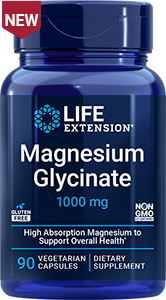
Magnesium Glycinate vs. Citrate: Which Type is Best for You?
Published: November 2024
When it comes to the dietary supplements you're considering taking, magnesium is likely on your radar. Magnesium supplements offer a number of benefits, including supporting heart, brain, and bone health. Over 300 enzymes in your body need it to perform critical functions. And yet, most of us don't get enough magnesium through diet alone. This is where supplements come in. Taking an adequate dose of a quality supplement consistently is the best way to cover your nutritional bases.
But there are different types of magnesium supplements, which can incorporate one or several different forms of magnesium. So how do you know which magnesium supplement to take? In this article, we'll be focusing primarily on two types: magnesium glycinate and magnesium citrate. We'll also touch on other forms of magnesium supplements.
What is magnesium citrate?

Magnesium citrate is a form of magnesium salt combined with citric acid, also known as citrate. A science-backed magnesium supplement that contains magnesium citrate supports overall whole-body health, including cardiovascular function.
Importantly, magnesium citrate is an organic salt because it's complexed with citrate and not a mineral such as chloride or phosphate. Organic forms, such as magnesium citrate, contain a relatively lower concentration of magnesium and are generally considered to have better absorption and bioavailability based on published data and may be less likely to cause gastrointestinal side effects in some people at high doses compared with inorganic forms of magnesium.
Indeed, one of magnesium citrate's strengths is that it is well absorbed because of it's high solubility, meaning the body can use it easily, and it's also affordable.
Life Extension utilizes magnesium citrate to provide rapid uptake of elemental magnesium alongside magnesium oxide that’s been specifically formulated with timed-release microbeads for long-term release (over a six-hour time period) in its Extend-Release Magnesium supplement. We also offer a formula that utilizes magnesium citrate with magnesium oxide and magnesium succinate. Both these formulas support bone and cardiovascular health.
What is magnesium glycinate?
On the other hand, we have magnesium glycinate, which is a salt formed with glycine, as opposed to citrate. Glycine is an amino acid that functions as an inhibitory neurotransmitter. This amino acid is sometimes used as a standalone supplement to promote sleep.
How are magnesium glycinate and citrate different?
This is a tricky question! On one hand, the differences between these two popular types of magnesium seem pretty big: magnesium citrate is complexed with citrate to form an organic salt, while magnesium glycinate is complexed with an amino acid. But in terms of benefits to your body, they are pretty similar.
So, when it comes to magnesium citrate vs. glycinate, which one prevails? Magnesium citrate and magnesium glycinate are both common choices to promote heart and bone health. Both are well-absorbed forms of magnesium that support whole-body health, but everyone's biology is different, so it will depend on your preferences. Consult your doctor or nutritionist to see which option is best for you.
What are other forms of magnesium?

Aside from magnesium citrate and glycinate, magnesium is available in different forms that have their own specific percentages of elemental magnesium, as well as varying levels of bioavailability/absorption. Here are some of your options:
Magnesium oxide
: Magnesium oxide (MgO) is the magnesium salt of oxygen. It is less soluble than magnesium citrate but contains a higher percentage of elemental magnesium per single dose.Magnesium chloride
: Magnesium chloride (MgCl2) is an inorganic form of magnesium, like magnesium oxide.Magnesium threonate
: What's innovative about the L-threonate form of magnesium is it works with the brain to support memory and cognitive health. Our Magnesium L-Threonate formula provides 144 mg of magnesium.Magnesium malate
: Magnesium malate contains malic acid, which is naturally found in things like fruit and wine.Magnesium sulfate
: This is magnesium combined with sulfate (MgSO4). It's also referred to as Epsom salt. Although it has a poor taste, this magnesium supplement can be consumed orally. Some people will dissolve it in bathwater to help soothe their muscles, although the evidence for this is lacking.
Magnesium absorption: What forms of magnesium are well-absorbed?
Good news: generally, the body absorbs all forms of magnesium pretty well. So what's the difference? Organic forms, such as magnesium citrate and magnesium glycinate, offer a lower concentration of magnesium in a single dose.
On the other hand, inorganic forms like magnesium oxide offer a higher concentration of elemental magnesium in a single dose. Magnesium oxide is typically used in multi-ingredient products to deliver a high concentration of elemental magnesium without increasing the number of pills needed.
That being said, the most important thing is consistent supplementation! This matters more than whether you take magnesium glycinate, magnesium citrate, magnesium oxide, or any other form. Take your supplement every day, following the dosage on the bottle.
You can also take a blood test for serum magnesium periodically to assess your status.
What is the best type of magnesium supplement?
This depends on your needs, goals, and current magnesium status. If you want something for general, whole-body health and to maintain optimal magnesium levels, magnesium glycinate is a good choice. And while magnesium oxide offers a higher concentration of elemental magnesium, organic forms like magnesium citrate and glycinate may provide advantages in terms of absorption for some individuals (because remember, every body is unique!).
So, in a nutshell, both organic and inorganic forms have advantages, and both can be effective depending your particular circumstances and health goals. Case in point: if you want to increase your magnesium levels with a formula that offers more brain-friendly benefits, something like magnesium L-threonate is going to be a better option.
How do I know if I need a magnesium supplement?
If you're ever unsure of which form is the right fit for you, speak with your healthcare provider. You can take a magnesium lab blood test to check your current blood serum levels.
Does magnesium help with bowel regularity?
Note: some forms of magnesium do have a laxative effect. These are usually labeled specifically for this purpose and tend to come in a powder that can be mixed in water to create an oral formula. Not all magnesium formulas are intended to be laxative, however. Always follow the dosage on the label and avoid taking too much magnesium to avoid this laxative effect.
What should I look for when buying magnesium?
When looking for magnesium (or any) supplements, choose a reputable company that offers high-quality products made with responsibly sourced ingredients. The nutrition labeling should be thorough and transparent with no hidden ingredients.
Furthermore, the supplement should cater to your specific needs. So really, you have options! You can maintain adequate magnesium status with both organic and inorganic forms. The key with this and any supplement is to take it consistently, as directed on the bottle. So consider both magnesium citrate and magnesium glycinate in your quest for good health! Look at how often the dosage is (once daily vs. multiple times a day) and also make sure your gastrointestinal tract is "cooperative" with the form you've chosen. It's always a smart idea to speak with your healthcare provider before starting to take any new supplements to ensure that they're a safe and effective option for you.
References
- Ates, Mehmet et al. "Dose-Dependent Absorption Profile of Different Magnesium Compounds." Biol Trace Elem Res., December 2019, https://pubmed.ncbi.nlm.nih.gov/30761462/
- Blancquaert, Laura et al. "Predicting and Testing Bioavailability of Magnesium Supplements." Nutrients, July 2019, https://www.ncbi.nlm.nih.gov/labs/pmc/articles/PMC6683096/
- Felice, Valeria D. et al. "Bioaccessibility and Bioavailability of a Marine-Derived Multimineral, Aquamin-Magnesium." Nutrients, July 2018, https://www.ncbi.nlm.nih.gov/labs/pmc/articles/PMC6073474/
- Guerrera, Mary P., MD et al. "Therapeutic Uses of Magnesium." American Family Physician, July 2019, https://www.aafp.org/afp/2009/0715/p157.html
- Marcin, Ashley. "How to Use Magnesium Citrate for Constipation." Healthline, April 2021, https://www.healthline.com/health/digestive-health/magnesium-for-citrate-constipation
- Shen, Yanling et al. "Treatment Of Magnesium-L-Threonate Elevates The Magnesium Level In The Cerebrospinal Fluid And Attenuates Motor Deficits And Dopamine Neuron Loss In A Mouse Model Of Parkinson's disease." Neuropsychiatr Dis Treat., November 2019, https://pubmed.ncbi.nlm.nih.gov/31806980/
- Uysal, Nazan et al. "Timeline (Bioavailability) of Magnesium Compounds in Hours: Which Magnesium Compound Works Best?." Biol Trace Elem Res., January 2019, https://pubmed.ncbi.nlm.nih.gov/29679349/
- Yablon, Lisa A. et al. "Magnesium in Headache." Magnesium in the Central Nervous System, 2011, https://www.ncbi.nlm.nih.gov/books/NBK507271/
Like what you read?
Please subscribe to get email updates on this blog.






